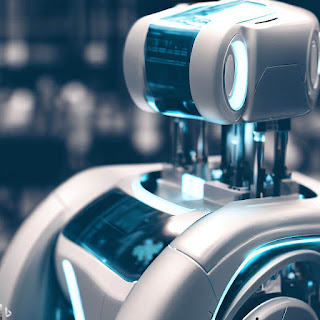Artificial intelligence (AI) is the ability of machines to perform tasks that normally require human intelligence, such as reasoning, learning, decision making, and problem solving. AI has been advancing rapidly in various fields, including healthcare, where it has the potential to transform the way we diagnose, treat, and prevent diseases.
 |
| The Role of AI in Healthcare |
{getToc} $title={Table of Contents}
AI can help improve patient care in many ways, such as:
Enhancing Diagnosis and Treatment
AI can analyze large amounts of data from various sources, such as medical records, images, lab tests, and wearable devices, to provide accurate and timely diagnosis and treatment recommendations. For example, AI can help detect cancer at early stages by analyzing mammograms or skin lesions, or suggest the best drug combinations for personalized therapy.
AI can also assist doctors in making complex decisions, such as choosing the optimal surgical plan or predicting the risk of complications. For example, AI can help plan the best route for removing a brain tumor or estimate the likelihood of bleeding during surgery.
Improving Efficiency and Quality
AI can automate repetitive and tedious tasks, such as scheduling appointments, billing, coding, and documentation, to save time and resources for healthcare providers. For example, AI can help generate summaries of patient visits or transcribe voice notes into electronic health records.
AI can also monitor and optimize the performance and quality of healthcare systems, such as reducing errors, waste, and fraud, or improving patient satisfaction and outcomes. For example, AI can help identify gaps in care or prevent hospital readmissions by analyzing patterns and trends in data.
Empowering Patients and Caregivers
AI can enable patients and caregivers to access information and services more easily and conveniently, such as through chatbots, voice assistants, or mobile apps. For example, AI can help answer common questions or provide reminders about medications or appointments.
AI can also support patients and caregivers in managing their health and wellness, such as through personalized coaching, feedback, or recommendations. For example, AI can help monitor vital signs or symptoms or suggest lifestyle changes or interventions based on individual preferences and goals.
Advancing Research and Innovation
AI can accelerate the discovery and development of new drugs, devices, and therapies by analyzing vast amounts of scientific literature and data. For example, AI can help identify novel targets or compounds for drug development or optimize clinical trials design and recruitment.
AI can also foster collaboration and innovation among researchers and clinicians by facilitating data sharing and integration across disciplines and institutions. For example, AI can help create platforms or networks for exchanging ideas or best practices or solving challenges.
Conclusion
AI is playing an increasingly important role in healthcare by revolutionizing patient care in various aspects. AI can help enhance diagnosis and treatment, improve efficiency and quality, empower patients and caregivers, and advance research and innovation. However, AI also poses some challenges and risks that need to be addressed carefully, such as ethical issues, privacy concerns, human-machine interaction issues etc. Therefore it is essential to ensure that AI is used responsibly and appropriately for the benefit of all stakeholders in healthcare.
